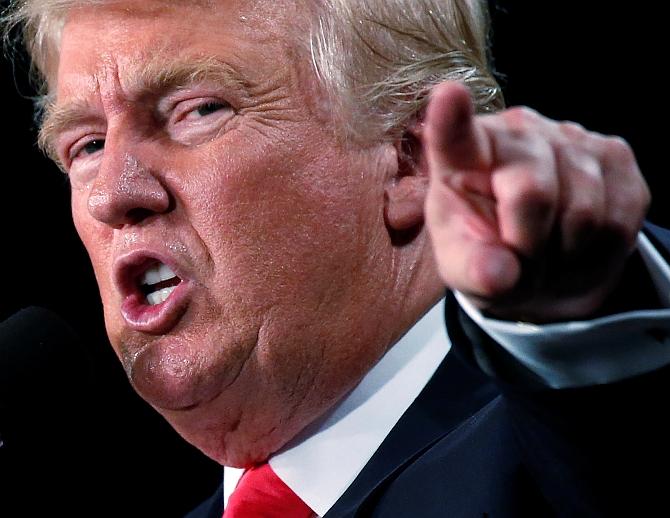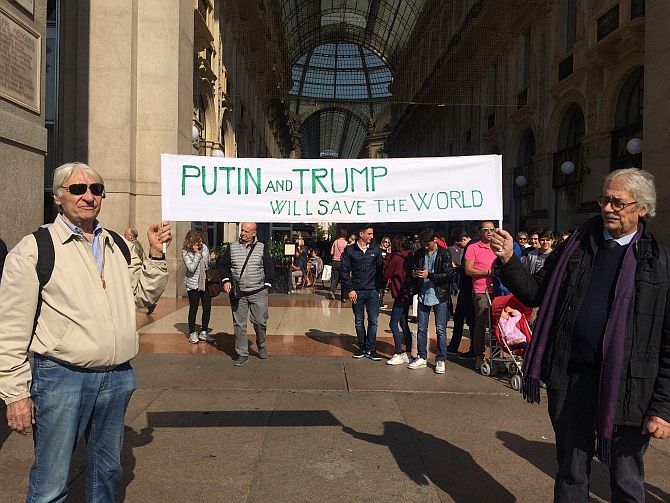The US foreign and security policy establishment, says Ambassador M K Bhadrakumar, apprehends that Trump may compel them to exorcise the 'unipolar predicament', and bring foreign and security policies to reflect the desires and priorities of the American public.
The first of a two-part appraisal.

The unthinkable became the thinkable when the biggest political earthquake since the collapse of the Soviet Union a quarter century ago occurred with Donald Trump's election as the President of the United States.
The seismic ruptures are going to be phenomenal. An American commentator aptly compared the event to the two fateful German elections of 1932 that led to Adolf Hitler's rise to power.
Of course, that conjures up powerful symbolism, which is unwarranted in its apocalyptic evocation. What indeed bears comparison is that the post-Cold War international order once again threatens to be overrun and the global economy and geopolitics will radically change course.
What lies in the womb of time?
For a start, it is necessary to remove the cobwebs of the mind. There are two searching questions involved here.
One, how is Trump's Presidency going to fare any better than his predecessor Barack Obama's who also had stormed the citadel in 2008 as an 'outsider', but ended up by 2016 as a faithful valet of the American establishment?
Woven into this is the reality that most observers of American politics -- in India, especially -- are blasé that the US establishment ultimately devours its demons and will remain immutable, permanent.
Two, there is a troubling question whether in the increasingly dysfunctional American political system Congress wouldn't stymie even Trump's best-laid plans?
After all, Obama couldn't ensure the permanence of his greatest foreign policy legacy -- the Iran nuclear deal -- and had to settle for a mere agreement that can always be rewritten or even erased, instead of a full-fledged treaty, because the latter would have needed Congressional approval, which he feared wouldn't be forthcoming.
Both the above two questions have some merit. But then, the circumstances and context in which those struggles took place have changed -- not only within America but in the world in which American power has been operating for the past seven decades or so since World War II.

Trump and Obama are not comparable. Obama's election in 2008 was largely a reaction to the exasperating George W Bush Presidency, which had touched its nadir (for a variety of factors that we need not go into here.)
Obama positioned himself with a perfect sense of timing and receptivity to garner the negative fallouts of the Bush era and turn them to his advantage by presenting himself as the harbinger of 'change'.
Quite obviously, the situation today is different. Obama himself enjoys a high rating for his performance as President.
Trump's platform is fundamentally different. First, it is built on the white vote. Cutting across gender, age or education, whites voted for him. Indeed, he tapped the anti-establishment mood, but it was not an angry 'anti-Obama' mood.
Actually, it went far beyond that. It was a dark mood of despair of the dispossessed who felt abandoned by the country's ruling elites and the two mainstream political parties.
Again, Trump understood the groundswell of American nativism and sensed that what passes for the liberal constituency was underestimating its potency.
Forgotten men and women
Trump's celebrity status may have added to his appeal and most certainly his entry as a rank outsider tilting at the windmills of the discredited political system caught attention.
All in all, if Obama's candidacy was tactical, Trump's is strategic.
Therefore, it may have inherent dangers insofar as Trump could be riding the tiger of post-truth politics, which means he is also going to be under incredible pressure to live up to the expectations raised by his narrative.
He does not enjoy the latitude to waffle once in power, as Obama could. Obama's promise of 'change' was inchoate. But Trump's narrative is very specific -- as he underscored in his victory speech in New York: 'The forgotten men and women of our country will be forgotten no longer.'
Obama never brought himself to make such a poignant, horribly accountable promise. Herein lies the salience. What matters is that Trump's domestic agenda cannot be segregated from his foreign policy.
Without a foreign policy that is attuned to the domestic agenda, he cannot deliver on his daunting promises -- 'We are going to fix our inner cities and rebuild our highways, bridges, tunnels, airports, schools, hospitals. We're going to rebuild our infrastructure, which will become, by the way, second to none, and we will put millions of our people to work as we rebuild it... We will embark upon a project of national growth and renewal... We have a great economic plan. We will double our growth and have the strongest economy.'
And, vice versa -- if Trump is serious about his domestic agenda, he needs to pursue a certain foreign policy orientation that helps him fulfil his electoral pledge and which at the very minimum will not undermine his priority task of America's reconstruction and relaunch. This needs to be carefully understood.
The second question -- whether Congress would frustrate Trump's programme -- is easy to answer. In systemic terms, the President enjoys free scope of action in foreign policy. The checks and balances that are there in the system are more applicable to domestic policies.
Therefore, except in the event of a war or if appropriations for war are required (which seem far-fetched in terms of Trump's core beliefs), Congress' say in foreign policies is very limited.
Moreover, it must be taken into account that Trump’s victory is comprehensive. He held not only the Republican bastions ('flyover states') but most of the so-called 'battleground states'and the Republican Party's Congressional candidates who had initially distanced themselves from Trump finally rode to victory carried by the wave of white electorate he created.
How could they forget that bitter-sweet experience of snatching victory out of the jaws of near-certain defeat by hanging on to Trump's coat-tails?

It is a rare thing in the past hundred years that the Republicans will now be controlling the White House and Congress together. That makes Trump a strong President.
While there is likelihood of differences cropping up between the President and the Congressional Republicans, this would happen more on domestic issues -- race, gender and sexuality-issues, abortion, etc, rather than on Trump's military, diplomatic, security policies that overlap in his foreign policy.
Core beliefs
This brings us to the third, and most important, question: What are Trump's core foreign policy beliefs? Does he have any such beliefs at all?
The heart of the matter is that behind Trump’s bluster, which he was entitled to as any candidate struggling to reach the centrestage in a high-stakes election involving vastly more experienced politicians, it is possible to discern a consistent worldview.
And it stands out as a coherent and well-informed worldview (especially as regards America’s strengths and weaknesses in a world that is spinning out of control), much as one may agree or disagree with it.
At its core, Trump has repeatedly said that his foreign policy ideology narrows down to 'America First'. He has been plain-speaking as to what he meant by that -- 'My foreign policy will always put the interests of the American people, and American security, above all else. That will be the foundation of every decision that I will make.' Period.
This core belief has been interpreted to mean that Trump is an 'isolationist'. Nothing can be more far-fetched than the thesis that this billionaire who has business interests or has made his vast fortunes in places as diverse as Manhattan, Panama, Vancouver, Istanbul, Dubai, Pune and Bali never heard of the alluring vistas that 'globalisation' opened up.
Most certainly, Trump's prism is different. His engagement with the world community will be on vastly different terms.
It can no longer be in terms of America's sense of destiny borne out of the credo of 'exceptionalism', which Obama used to extol, but will be almost exclusively rooted in the country's self-interests, in terms of safeguarding American security and economic and political interests.
Equally, Trump is adamant that the US' engagements with the outside world need to be cost-effective. As any American businessman would say, there is nothing like a free lunch.
Trump is completely unsentimental about allies and friends. Everything depends on the utility of the relationships and alliances and he will subject them to severe cost-accounting principles.
Trump is probably making a virtue out of necessity here because he is acutely conscious of the state of disrepair within America and of his stated priority to attend to it as priority.
Having said that, a retrenchment by the US from the world arena is far from his thoughts.
Wouldn't he know, after all, that imperialism is the highest stage of capitalism -- if not the monopoly stage of capitalism?
Most certainly, Trump cannot be unaware of the historical place of this stage of capitalism in America. Cartels, protection, the domination of the financiers, colonial policies, military-industrial complex -- these are integral to the working of the American economy.
Put differently, in order to meet the objectives of mercantilism that Trump ardently espouses, the US has no option but to continue to assert its power over other countries.
How does this world view translate in contemporary world politics?
Trump has shared his thinking with regard to the US' relations with Europe, Eurasia, West Asia and Asia-Pacific.
What comes out clearly is that Trump does not attach high importance per se to the US' trans-Atlantic leadership. The dark forebodings in the European mind in regard of a Trump presidency are quite understandable.

Critics oppose the accords for a number of reasons, including fears over genetically-modified foods, environmental standards, workers' rights and pharmaceuticals.
Photograph: Axel Schmidt/Getty Images
Europe in the cusp of change
Simply put, Trump is not a fan of Euro-Atlanticism.
It is fairly certain that he is not going to revisit the moribund Transatlantic Trade and Investment Partnership Agreement, TTIP, which was supposed to have been a platinum grade trade agreement between the US and the European Union aimed at promoting trade and multilateral economic growth.
Indeed, the TTIP negotiations have been tortuous and the idea has run to headwinds in Europe itself. Considering that United States and European Union together represent 60% of global GDP, 33% of world trade in goods and 42% of world trade in services, the collapse of the TTIP has serious implications for world trade and the global economic architecture.
A free trade agreement between the EU and the US would have meant potentially the largest such agreement in history, covering 46% of the world economy.
More importantly, TTIP was conceived originally by the US as a companion agreement to the Trans-Pacific Partnership (covering 12 of the Pacific Rim countries, but excluding China), and the two together would have provided key pillars of the US’ containment strategies against Russia and China, alongside the Western alliance system.
If Trump abandons the TTIP, it becomes a serious blow to the EU integration processes, which are already in serious disarray -- coping with the refugee crisis, Brexit, economic difficulties, etc.
Meanwhile, European security, without the overarching compelling trans-Atlantic leadership by the US, is slated to enter unchartered waters.
Added to that, Trump is ambivalent toward the continued relevance of NATO. He has openly demanded that the present arrangement whereby the US underwrites three-fourths of the NATO budget is unacceptable.
However, this is a tall demand at a time when defense budgets among most NATO nations are expected to be flat at best for the foreseeable future.
On the other hand, NATO countries also constitute a steady market for American weaponry. The NATO countries' 'interoperability' of alliance assets is a powerful exporter tool for promoting US arms, too.
Evidently, Trump will review the alliance's post-Cold War posturing. It appears that he doesn't yet have his NATO position.
During the second term of the Obama Presidency, following the eruption of tensions over the regime change in Ukraine in February 2014, had shifted the NATO posturing in a pronounced way directed against Russia.
Would Trump see the raison d’etre of the NATO posturing the way his predecessor did? It seems unlikely.
For Obama, this anti-Russian posturing made sense in rallying the European allies behind the US' trans-Atlantic leadership and in giving Washington the space to insert itself and have a decisive say to interfere in Russia's relations with its European partners.
In short, Obama finessed the NATO posturing in such a way as to strengthen the US' containment strategies toward Russia, pursued by successive administrations since Bill Clinton.

On the contrary, from what one can figure out from Trump's pronouncements, he intends to upturn the US' containment strategies against Russia.
How far he will succeed in overcoming the entrenched animus against Russia -- a legacy of the Cold War -- within the US foreign and security policy establishment and the Pentagon (as well as among think-tanks and mainstream media) remains to be seen.
Unsurprisingly, the early Russian comments on Trump's election victory suggest that Moscow is keeping its fingers crossed.
On the other hand, President Vladimir Putin's initial remarks on hearing about the US election results have underscored that Russia will respond positively and eagerly to any effort by Trump to reverse the downhill slide in Russian-American relations.
Therefore, assuming that Trump eventually succeeds in cutting his way through the thicket of institutional opposition to his Russia policies in the Washington Beltway, we may expect a sea change in the European and Eurasian security climate in the coming period.
Trump is unlikely to put the weight of US diplomacy behind shepherding the European countries to keep the sanctions against Russia in place. Now, in the absence of such a US' diktat, a consensus in favour of keeping the sanctions in place is hard to reach.
Thus, the removal of the Western sanctions against Russia in a near future is to be expected -- possibly, as early as the first half of next year.
At best, Trump may link the dismantling of Western sanctions against Russia to an understanding over the future of Ukraine, where again he has hinted at a willingness to concede Moscow's legitimate interests in Eurasia.
The big question will be the deployment of the ABM system by the US on Russia's borders. Again, it is entirely conceivable that Trump may stall on future deployment and the pre-positioning of US military personnel and weapons in Central Europe and the Baltics.
A rollback cannot happen overnight, but may become possible if and when the US-Russia tensions begin to ease.
The bottom line, therefore, is that Russia may be able to regain its due place in its desired habitat, namely, as a European power, able to develop its partnerships without rude American interference.












